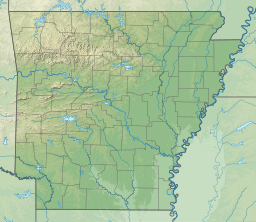This is an old revision of this page, as edited by ZeeveeP (talk | contribs) at 06:29, 31 July 2023 (Added links to page). The present address (URL) is a permanent link to this revision, which may differ significantly from the current revision.
Revision as of 06:29, 31 July 2023 by ZeeveeP (talk | contribs) (Added links to page)(diff) ← Previous revision | Latest revision (diff) | Newer revision → (diff)This article has multiple issues. Please help improve it or discuss these issues on the talk page. (Learn how and when to remove these messages)
|
| Millwood Lake | |
|---|---|
 | |
| Location | Southwestern Arkansas |
| Coordinates | 33°45.83′N 94°1.23′W / 33.76383°N 94.02050°W / 33.76383; -94.02050 |
| Type | Reservoir |
| Catchment area | 4,144 sq mi (10,730 km) |
| Basin countries | United States |
| Surface area | 29,200 acres (11,800 ha) |
| Shore length | 65 mi (105 km) |
| Surface elevation | 259.2 ft (79.0 m) |
| Shore length is not a well-defined measure. | |
Millwood Lake is a reservoir in southwestern Arkansas, United States. It is located 9 miles (14 km) from Ashdown and is formed from the damming of the point where Little River and Saline River meet.
Statistics
| This section does not cite any sources. Please help improve this section by adding citations to reliable sources. Unsourced material may be challenged and removed. (May 2023) (Learn how and when to remove this message) |
Lake statistics:
- Drainage area above the dam: 4,144 sq mi (10,730 km)
- Elevation above sea level of the top of flood control pool: 287 ft (87 m)
- Elevation above sea level of the top of conservation pool: 259.2 ft (79.0 m)
- Elevation above sea level of the top of inactive pool: 252 ft (77 m)
- Surface area of lake at top of flood control pool: 95,200 acres (38,500 ha)
- Surface area of lake at top of conservation pool: 29,200 acres (11,800 ha)
- Shoreline length at top of conservation pool: 65 mi (105 km)
Dam statistics:
- Length of dam: 17,554 ft (5,350 m)
- Maximum height of dam above streambed: 88 ft (27 m)
- Length of spillway: 616 ft (188 m)
- Length of non-overflow section: 271 ft (83 m)
- Spillway crest gates (13), size: 40 ft × 32 ft (12.2 m × 9.8 m)
- Outlet conduits (2), size: 5.67 ft × 6 ft (1.73 m × 1.83 m)
- Water supply pipe (1), diameter: 6 ft 6 in (1.98 m)
Overview
Lake Millwood is mainly recognized for its fishing and birding access. It is also known for housing the 1,380-pound alligator, which was caught in the lake in 2012. Its 35,000 acres (14,000 ha) of submerged timber provide homes for the many varieties of fish in the lake, including the indigenous Millwood lunker largemouth bass. Other species of fauna around the lake include white-tailed deer, bobwhite quail, squirrel, dove, rabbit, raccoon, armadillo, opossum, fox, mink, American gator, and beaver. Boating is also popular on Millwood Lake, but only a small part of the whole surface area of the lake can be used as boating due to the submerged timber that takes up 30,000 acres (12,000 ha) of the pond. Lake Millwood also has a diverse flora life, with many plants and trees such as gum, oak, birch, pine, juniper, flowering shrubs, and wildflowers.
History
The Millwood Lake project was authorized by the Flood Control Act of 1946, and modified by the Flood Control Act of 1958. The dam and lake were designed and built by the Tulsa District of the Army Corps of Engineers, which still maintains the lake's Beard's Bluff recreation center. The projects construction work began in 1961, and was finished for flood control operations in 1966 at a cost of $44,000,000. The lake and dam were dedicated on December 8, 1966. The lake is the key in the general flood reduction system for the Red River below Lake Texoma.
Water use
| This section does not cite any sources. Please help improve this section by adding citations to reliable sources. Unsourced material may be challenged and removed. (May 2023) (Learn how and when to remove this message) |
Benefits of the lake have been restoring wildlife, providing water to nearby areas, and preventing an estimate of $9,715,000 in flood damage. In Ashdown, Arkansas, the lake supplies Domtar's (formerly Georgia Pacific) Communications Paper Division with 50 million gallons of water each day for its operations. The lake also provides drinking water to the city of Texarkana, Arkansas, through a water treatment plant located at Ashdown.
See also
References
- "Millwood Lake", Misplaced Pages, 2023-03-12, retrieved 2023-03-28
- "Millwood State Park | Arkansas State Parks". www.arkansasstateparks.com. 2020-07-27. Retrieved 2023-05-17.
- https://a-z-animals.com/blog/the-biggest-alligator-ever-found-in-arkansas/
- "Millwood Lake", Misplaced Pages, 2023-03-12, retrieved 2023-03-28
- "Millwood Lake", Misplaced Pages, 2023-03-12, retrieved 2023-03-28
- "U.S. Geological Survey - Scientific Investigations Map 3282".
External links
- Millwood Lake at the Library of Congress Web Archives (archived 2009-06-18)
- Bathymetric Map, Area/Capacity Table, and Sediment Volume Estimate for Millwood Lake, Near Ashburn, Arkansas, 2013 United States Geological Survey
- Fishing Millwood Lake Black Bass, Crappie and Catfish
- Reservoirs in Arkansas
- Protected areas of Little River County, Arkansas
- Protected areas of Hempstead County, Arkansas
- Protected areas of Howard County, Arkansas
- Protected areas of Sevier County, Arkansas
- Buildings and structures in Hempstead County, Arkansas
- Buildings and structures in Howard County, Arkansas
- Buildings and structures in Sevier County, Arkansas
- Buildings and structures in Little River County, Arkansas
- Dams in Arkansas
- United States Army Corps of Engineers dams
- Dams completed in 1966
- Bodies of water of Hempstead County, Arkansas
- Bodies of water of Howard County, Arkansas
- Bodies of water of Little River County, Arkansas
- Bodies of water of Sevier County, Arkansas